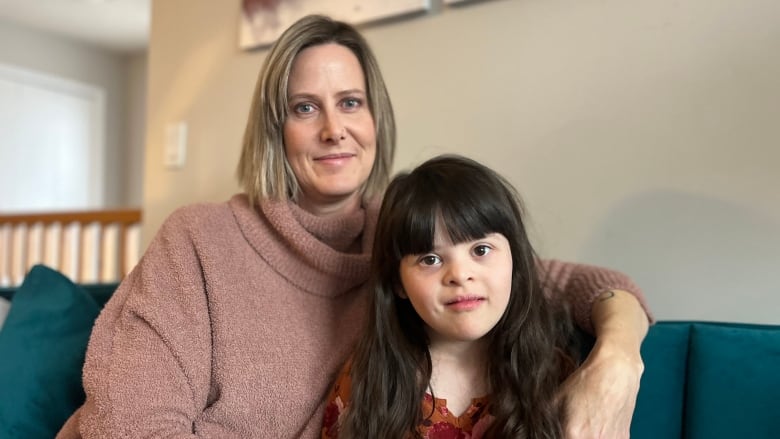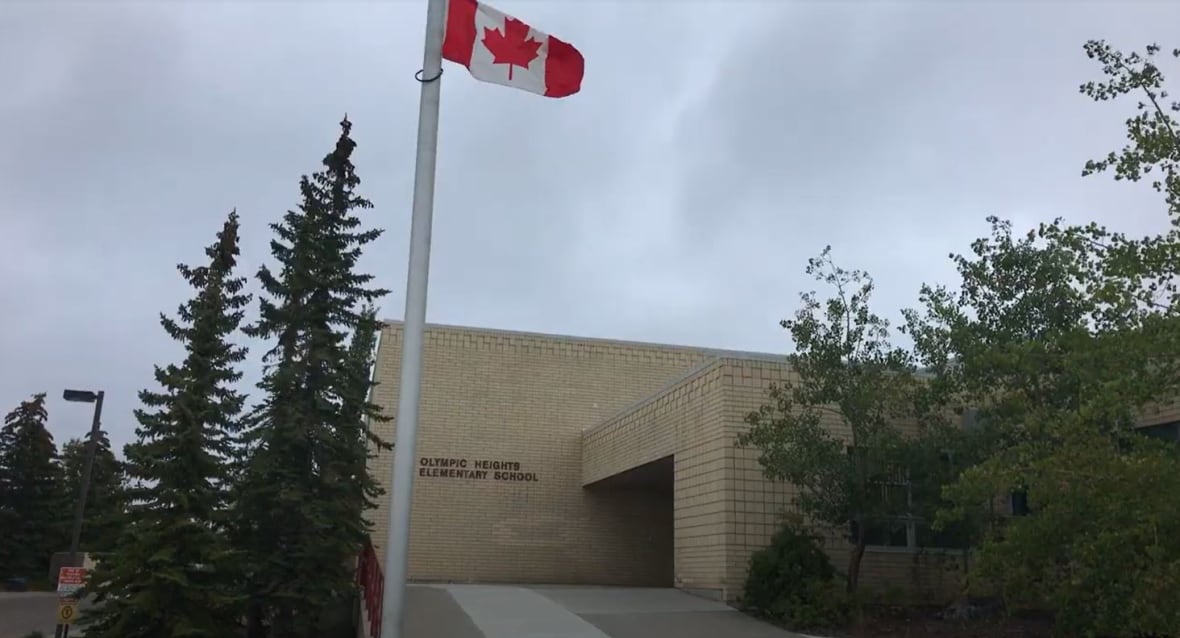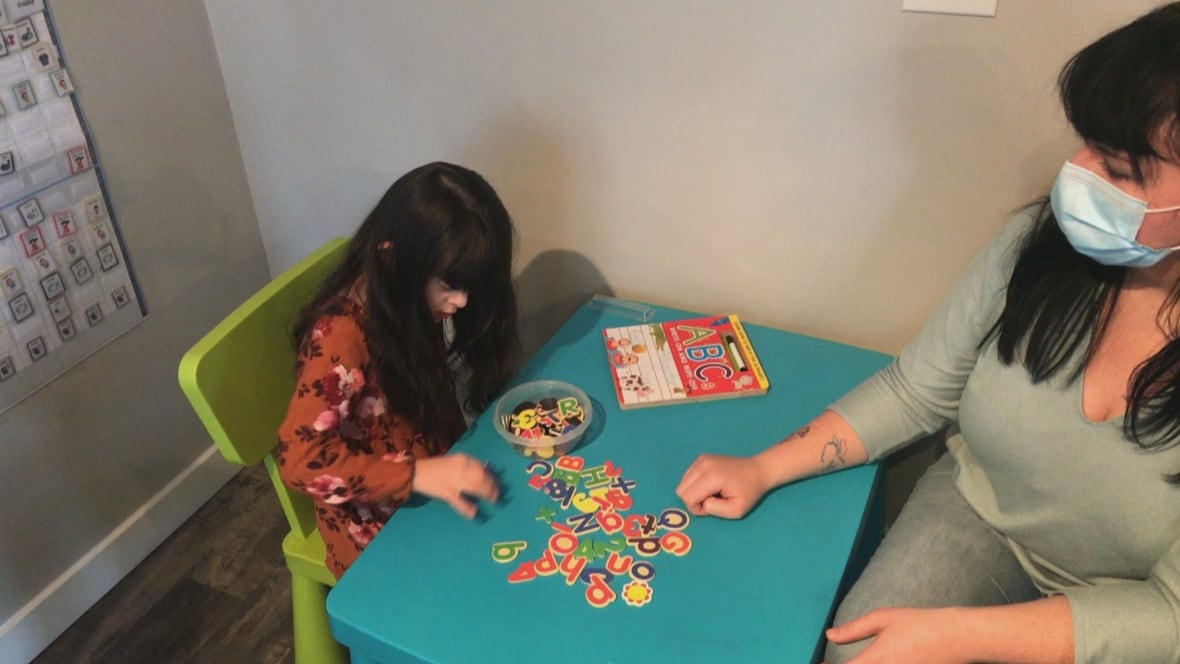Calgary girl with Down syndrome stuck at home due to lack of school supports
Calgary Board of Education says it’s working with the family to address concerns.

Shawna Risdon says it feels like no one seems to care that her seven-year-old daughter Sadie isn’t able to attend school because of a lack of specialized supports. Lucie Edwardson CBC
Lucie Edwardson, CBC News Calgary September 21, 2022
It’s nearly three weeks into the school year and Shawna Risdon’s seven-year-old daughter, Sadie, hasn’t attended a single day of classes.
The mother says Sadie, who has Down syndrome, was meant to start Grade 1 at the Olympic Heights School in southwest Calgary a few days after her classmates to allow the class time to get in the groove before she joined.
But in the days since, the school’s administration hasn’t been able to ensure Sadie’s safety once she’s there, says Risdon.
She says she was told specifically about a child with Down Syndrome who was at the school the last couple of years who was frequently disappearing from the school.
“They were having to go and find the child in the playground or outside of the school grounds, and that just raised a lot of concerns for Sadie because she has kind of an extreme compulsion when it comes to escaping care,” said Risdon.
“We were just told basically that there are no full-time supports that Sadie would have in her classroom to keep her safe. That she could escape care and they would do their best, but they couldn’t guarantee that she would be safe.”
| Encouraged to withdraw |
During that conversation, Risdon says, it was then suggested she simply withdraw her daughter from school.
For now, Sadie watches every morning when her 10-year-old sister leaves for school while she gets ready for another day at home.

Risdon says the principal at Olympic Heights School suggested she withdraw Sadie, as they are not able to meet her complex needs. Lucie Edwardson CBC
“It’s very disheartening. It led us to believe that kids with disabilities are slipping through the cracks and no one is there to catch them. No one seems to be able to go to bat to make sure their needs are met in school. It’s just very heartbreaking,” said Risdon.
In a statement, the Calgary Board of Education says it’s aware of the situation and is working with the family to address their concerns, but that it would not speak to the specifics “to protect the privacy of the family.”
| ‘Safe, inclusive learning environments’ |
The school board said that as an organization it welcomes all students regardless of background or ability, and it works closely with families to determine the best supports and programming for a child.
“School principals work to balance complexity and the range of student needs in classes in a way that will optimize the experience for all students within available resources,” said spokeswoman Joanne Anderson.
“Our schools offer safe, inclusive learning environments, and many students who require specialized learning supports achieve success in their community schools.”
| Family paying for aid |
In order to make sure Sadie keeps learning, her parents have hired a full-time aide to be with her and take on a quasi-teacher role during school hours.
They did the same thing last year after a different CBE school said something similar about withdrawing Sadie as a student, and because she was at high risk for COVID-19 and respiratory complications. Having that aid during school hours cost the family $14,000 out of pocket.
“I think it’s unfair. The province does have funding for kids with complex needs through the school system, and I believe it’s thousands of dollars a year that each school gets,” Risdon said.
“I’m not really clear on why that funding, if Sadie was not able to attend school, didn’t flow to the parents — to the family that’s supporting her learning at home.”
| Alberta Education responds |
Alberta Education says it’s up to school boards to ensure that each student is provided with an education program.
“This includes specific obligations for school boards as they relate to students who may be in need of specialized supports and services,” wrote ministry spokeswoman Katherine Stavropoulos.
“School boards must provide a range of supports and services for students consistent with the principles of inclusive education.”
She said Alberta Education provides a number of grants, including the Specialized Learning Supports (SLS) grant, the Early Childhood Services (ECS) Program Unit Funding (PUF) grants, to school authorities that ensures they have “the flexibility to support the unique needs of every student.”
| ‘No accountability’ |
Risdon says it feels like there is a lack of accountability.
“The school passes the buck to the area office or the board, the board passes the buck to Alberta Education, and from Alberta Education it’s like it goes off into the abyss. There’s no accountability, there’s no responsiveness,” she said.
“It all just seems to fall on deaf ears, and the strong message is that kids with disabilities don’t matter.
“On Monday, Risdon told CBC News the family thought they might be coming to some sort of compromise with the school where the aide they have hired would be able to attend with Sadie.
“We have a tentative plan in place to have her attend the school, hopefully within the next couple of weeks. We need to get our care provider approved by the school, vetted for a criminal check, and then have our our full-time aide on our dime attend school with her,” she said.

Sadie is currently learning from home with the help of her aid, Tia, whose services are paid for out-of-pocket by the Risdon family during school hours. Lucie Edwardson CBC
But the CBE said that’s not a possible solution.
“School principals work to balance complexity and the range of student needs in classes in a way that will optimize the experience for all students within available resources,” wrote Anderson.
“This includes making decisions about educational assistants available in classrooms. Funding from an individual family cannot be used to provide additional human resource support during the school day.”
Risdon says if another student, without disabilities, was truant from school for this long, it would be a problem. But in Sadie’s case “no one seems to care.”
| About the author |
| Lucie Edwardson is a reporter with CBC Calgary. Follow her on Twitter @LucieEdwardson or reach her by email at lucie.edwardson@cbc.ca |
![]() Source CBC News Calgary
Source CBC News Calgary
Also see
Increase in Alberta education budget lags growth, rising costs, critics say CBC
Changes to education funding model ends AHS rehab partnerships in Alberta schools CBC
‘A step backwards’: Parent advocates say changes to PUF will lead to segregation of special needs kids CBC
